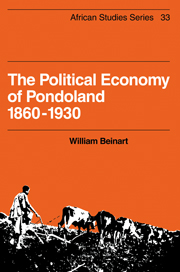Book contents
- Frontmatter
- Contents
- List of maps
- Preface
- Abbreviations
- Introduction
- 1 The political economy of Pondoland in the nineteenth century
- 2 Crops, cattle and the origins of labour migrancy, 1894–1911
- 3 Rural production and the South African state, 1911–1930
- 4 Chiefs and headmen in Pondoland, 1905–1930
- 5 Rural differentiation, alliance and conflict, 1910–1930
- Postscript
- Tables
- Notes
- Select bibliography
- Index
- BOOKS IN THIS SERIES
- Frontmatter
- Contents
- List of maps
- Preface
- Abbreviations
- Introduction
- 1 The political economy of Pondoland in the nineteenth century
- 2 Crops, cattle and the origins of labour migrancy, 1894–1911
- 3 Rural production and the South African state, 1911–1930
- 4 Chiefs and headmen in Pondoland, 1905–1930
- 5 Rural differentiation, alliance and conflict, 1910–1930
- Postscript
- Tables
- Notes
- Select bibliography
- Index
- BOOKS IN THIS SERIES
Summary
By the 1930s, the economic position in Pondoland could still be favourably compared with that in many other parts of South Africa's reserves. To take but a few indicators: rates of migrancy were lower; the number of cattle per capita was slightly higher; soil erosion was limited and landlessness rare. The people of the area were not necessarily ‘wealthier’ than those in other African communities; indeed, wealth and poverty are elusive concepts at a time when the penetration of commodity relationships was uneven. Mpondo homesteads were probably more self-sufficient, in general, in basic foodstuffs. But they also probably had a lower cash income: on average, the income of Mpondo migrants may have been lower, for education was less general, and, being amongst the last into the labour market, they tended to work in lower wage sectors such as the sugar fields. The feature of the area was that the homesteads were relatively less dependent on wage income, that access to rural resources had not been severely constrained, and that wages could still be invested in rural production. Yet in the regional political economy of South Africa as a whole, the people of Pondoland shared the relative poverty of African rural communities and were subject to the pressures operating on all the reserves. Available statistics are not entirely reliable but, together with other evidence, strongly suggest that in the next few decades there was a decline in the total number of stock held and the total amount of crops produced in Pondoland.
- Type
- Chapter
- Information
- The Political Economy of Pondoland 1860–1930 , pp. 161 - 165Publisher: Cambridge University PressPrint publication year: 1982

